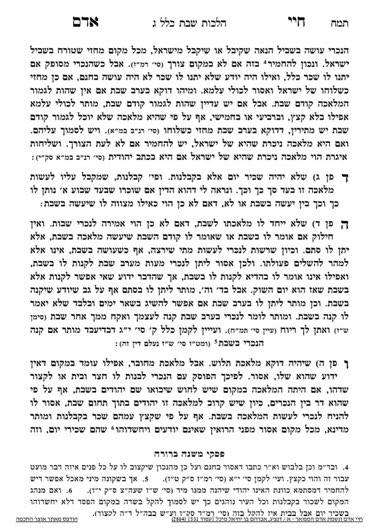We are continuing in siman 5, where the Chayei Adam discusses the fourth criterion for it to be permitted to make an arrangement with a non-Jew before Shabbos regarding melacha on Shabbos. This criterion is that the Jew cannot direct the non-Jew to specifically perform the work on Shabbos. Rather, he must give it to him and let the non-Jew perform the melacha on his own volition, and if he decides to perform it on Shabbos, it is his own choice.
Yesterday, the Chayei Adam discussed a scenario where the Jew asks the non-Jew to purchase items for him on Shabbos (the case of the yom hashuk), which is assur. We also learned that even if the Jew does not state explicitly, if the only way it will be possible for the non-Jew to complete the task is to perform it on Shabbos, it is assur as well, regardless of how early in the week the Jew made the arrangement. We learned that the Chayei Adam brings a leniency regarding an arrangement made earlier in the week, but the Mishnah Berurah disagrees.
The Chayei Adam brings another leniency. He writes that if the item is available during the rest of the week, the Jew may initiate the arrangement with the non-Jew on Friday, even if it is almost certain that the non-Jew will perform the work on Shabbos. Since the choice of when to perform the work is still in the hands of the non-Jew, it is muttar (as we have discussed earlier).
The Chayei Adam adds a third leniency. Rather than make the non-Jew into the shliach of the Jew, the Jew can suggest to the non-Jew that he purchase the merchandise on his own, and resell it to the Jew for a profit after Shabbos. Even though the Jew is arranging for work to be performed on Shabbos, the non-Jew is not the shliach of the Jew, because the non-Jew is buying the item for his own purposes (i.e, to resell), so it is muttar.
The Chayei Adam writes that one should look in hilchos yom tov, where he writes that bedieved, the item that was purchased by non-Jew for a Jew on Shabbos is Muttar to use on Shabbos. (presuming that the non-Jew is a kablan, he is paid a fixed amount, etc).
The Chayei Adam is referring to a case in which the Jew is a kablan, a fixed price is made up, and all other amira l’achum issues are resolved. If the non-Jew performs the action and brings the finished product or purchased item to the Jew on Shabbos, can the Jew benefit from it? We know that on shabbos, a Jew cannot benefit from the melacha performed by the non-Jew, but maybe bedieved it is muttar.
The Shulchan Aruch holds that it is muttar to benefit from the melacha, but the Rema holds it is assur. The Mishnah Berurah writes that even though it is appropriate to be machmir in this case, when it comes to purchasing items, one can be lenient. This is what the Chayei Adam means in hilchos yom tov,
Summary
- If one instructs a non-Jew before Shabbos, there are times when it will be muttar, depending on eight conditions.
- The fourth condition is that the Jew cannot direct the non-Jew to specifically perform the melacha on Shabbos. Rather, one must give him work without a specific timeframe, so that if the non-Jew chooses to perform the work on Shabbos, it is out of his own volition.
- If the work to be completed or item to be purchased is available all week, one can make the arrangement on Friday, even though it is likely the non-Jew will perform the work on Shabbos.
- One may also have the non-Jew buy an item for themselves, and then resell it to the Jew after Shabbos, so that the non-Jew is not a shliach of the Jew when purchasing the item.
- One should be machmir not to benefit from permitted melacha performed by a non-Jew on Shabbos itself.
- One may be lenient to benefit, on shabbos, from an item purchased on Shabbos by the non-Jew.



